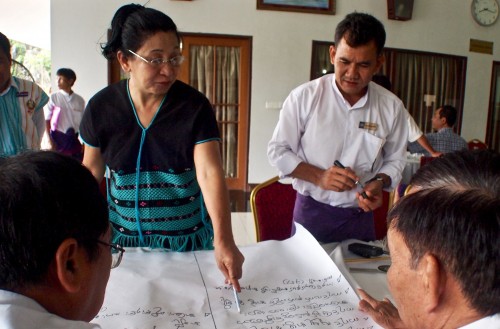Image: Training for regional politicians in Hpa-An, capital of Kayin state, Myanmar, ahead of the November 2015 elections. (Renko Tanis, Flickr).
An astonishing political transformation has taken place around the world over the past three decades. Most countries today are considered formal democracies, and elections have become almost universal. Since 2000, only five countries have not held elections at the national level (China, Eritrea, Qatar, Saudi Arabia, and the United Arab Emirates).
At next week’s DSA Conference 2016: Politics in Development, I’m sure elections will feature in the political settlements panel discussion for which I and Jan Pospisil from the University of Edinburgh are co-conveners. Elections are, after all, the most visible and well-established mechanism through which citizens can exercise voice and hold elected officials to account. They can make political settlements more inclusive and deepen the quality of democratic governance.
In post-conflict settings in particular, elections offer an opportunity to ‘rewrite the future of history’ – at least potentially. They make mass political participation possible, especially among previously disenfranchised groups, and also provide a critical opening to empower leaders and reform coalitions to make changes that would otherwise seem unimaginable. Think of the 1994 elections in South Africa, which ushered in multi-racial democracy, or of the potential for transformation in the more recent elections in Myanmar.
Elections have also been instrumental in increasing women’s participation in political systems. The number of women in parliament has almost doubled since 1997. This constitutes tremendous progress – even if there are ongoing debates about whether more women in politics automatically means more influence.
Yet, elections also have considerable limitations. In some places, they can spark violent conflict, especially when they generate “winner takes all” dynamics that raise the stakes of political competition. As the examples of Kenya in 2007 and Egypt in the aftermath of the Arab Spring illustrate, this can be especially treacherous where ethnicity, religion, or other fault lines of conflict determine political allegiance.
In addition, elections tend to be associated with increased clientelism and corruption. Money in politics, whether legitimate or “dirty”, has become a pernicious problem that has done much to pervert the process of democratic representation in both high-income and lower-income countries. Witness, for instance, the effect that the infiltration of organised crime has had on democratic institutions across Latin America and beyond. The relentless need to win elections, for its part, often generates incentives to focus on the short term needs and demands of narrow constituencies at the expense of the broader public good and longer term policy-making priorities.
Beyond these concerns, elections are a rather blunt instrument of representation: citizens can only express their views through the periodic ticking of a box for or against a given candidate or party. This kind of engagement between state and society is far from sufficient to nurture a culture of democratic dialogue and this may partially explain the profound dissatisfaction with the quality of representation that has become manifest in democracies everywhere.
Both parliaments and political parties tend to be the institutions citizens around the world trust least. This has profound implications for the legitimacy and quality of elections, as well as for democratic governance more broadly.
Research that I have undertaken with other colleagues suggests that, while people in low-income countries care about democracy and elections in principle, these are decidedly secondary concerns. Citizens value political freedoms and democracy mostly in relation to how democracies perform and whether they successfully provide expected goods and services. Such expectations can place democracies, especially poorer and/or more incipient ones, under considerable strain.
Yet, however imperfect, democratic systems are here to stay – so the question is no longer whether they can deliver, but how they can do so. If elections are hollow, or electoral processes are perceived to be flawed or to generate expectations that are consistently unmet or even ignored, they can undermine rather than strengthen the legitimacy of the state and its democratic institutions. One of the leading challenges for the international community in the 21st century is to support emerging democracies while tempering expectations of what they can achieve, especially in the short term, through the electoral channel.










